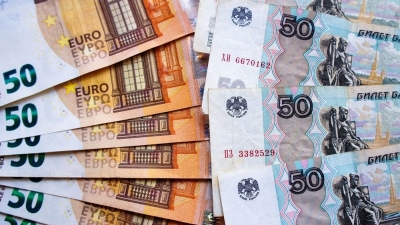EU-China trade slips as Beijing ‘de-risks’ from the West

The sharp reduction in the EU’s trade deficit with China in 2023 does not provide evidence that the bloc is successfully “de-risking” from China but rather supports the claim that Beijing is itself seeking strategic independence from the West, experts told Euractiv.
A report published by the EU’s official statistics office Eurostat on Monday (4 March) found that the bloc’s trade deficit with China shrank 27% in 2023 to €291 billion, from €397 billion in 2022. Exports declined by 3% to €223 billion, while imports fell 18% to €514 billion.
It also follows European Commission President Ursula von der Leyen’s call last year for the EU to “de-risk” — but not “decouple” — from China, both diplomatically and economically.
“We have seen a very deliberate hardening of China’s overall strategic posture for some time,” von der Leyen said last year. “And it has now been matched by a ratcheting up of increasingly assertive actions.”
However, Alicia García-Herrero, a senior fellow at Brussels-based think-tank Bruegel, said the decline in EU imports from China in 2023 was mostly cyclical, following a rise in 2022, driven in large part by European importers frontloading purchases of telecommunications equipment.
She also noted that the decrease in EU exports to Beijing was primarily a consequence of the latter’s successful implementation of import-substitution measures aimed at reducing China’s strategic dependence on the West.
“We’re not de-risking,” García-Herrero said. “What’s happening is that China is not importing from us. And the main reason is that they are substituting our imports.”
Philipp Lausberg, an analyst at the European Policy Centre (EPC), similarly noted that the decline in exports is a result of a decades-long process of China’s “home-shoring of strategic supply chains”.
“The big export boom for Europe, and particularly for Germany, over the last couple of decades was very much fueled by China importing investment goods and machinery,” he said. “But now China is more and more capable of building these goods on [its] own.”
Asked by Euractiv about the Eurostat study, European Commission chief spokesperson Eric Mamer said that “there are many many factors that influence trade flows over very specific periods of time”, and that it was too soon to comment on Monday’s data.
German troubles signal worrying trend
In its Economic Security Package announced in January this year, the European Commission called for enhanced export controls for goods with dual-use potential (i.e. civilian and military) to specific “countries of concern”. The measures were widely interpreted to be directed against China.
In the EU’s latest round of sanctions levelled against Russia — its thirteenth since Moscow’s full-scale invasion in February 2022 — the EU also banned exports to four Chinese firms that are suspected of supplying Russia with weapons in its offensive operations in Ukraine.
Lausberg noted that Berlin’s decoupling of its energy supply from Russia following the invasion has led to Germany’s “status as a manufacturing powerhouse” becoming “structurally endangered”.
He also stressed that high energy prices have caused German car and chemical companies to ramp up their foreign direct investments and production in China.
“These products will never appear on trade balance sheets because… they’re being produced in China and then consumed there,” he said. “So that is also a strategy change that has been pushed forward, especially in the past two years.”
Bruegel’s García-Herrero agreed that the decline in exports to China poses a “huge” risk to Germany’s continued prosperity.
“We should worry especially about Germany,” she said. “And I think by now we see it in the numbers… We should, basically, more than worry. We should do something about it.”
Read more with Euractiv




